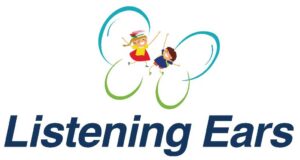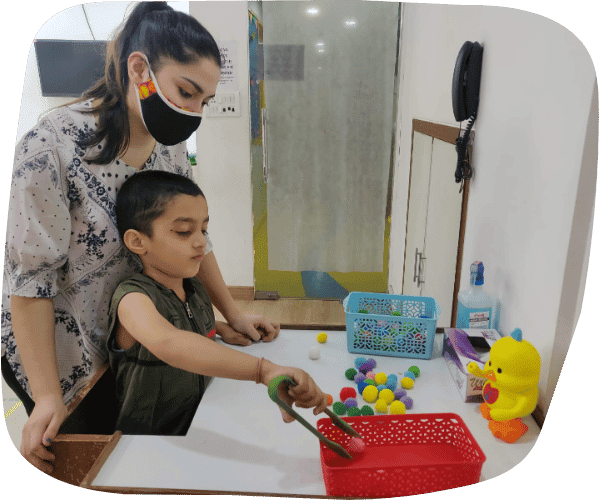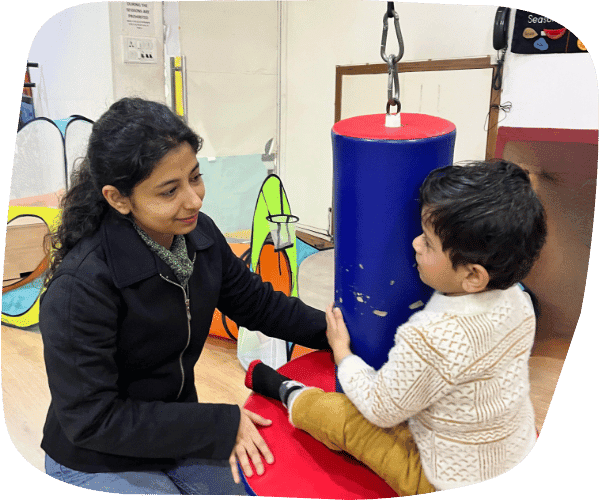Occupational Therapy
Do you know ?
Is your child struggling to hold a pencil, crayon, or spoon properly?
————————————————–
Does your child avoid activities like buttoning clothes, tying shoelaces, or using scissors?
————————————————–
Is your child overly sensitive to touch, sound, or certain textures?
————————————————–
Does your child have trouble sitting still or focusing during play or school activities?
————————————————–
Is your child clumsy or bumping into things more often than other children?
————————————————–
Does your child have difficulty with tasks that require coordination, like catching a ball or riding a tricycle?
————————————————–
If you are looking for early help or want guidance from trained therapists, our occupational therapy in Jasola services provide structured support to improve your child’s daily skills.
Our Occupational Therapists are here to support your child’s growth and independence.
Our Expertise
Our Occupational Therapy Department combines expertise and experience to skillfully address a wide range of conditions.
Sensory processing disorders
Developmental Delay
Birth injuries or birth defects
Learning problems
Autism spectrum disorder
ADHD
Cerebral Palsy
Downs Syndrome
Neurodevelopmental Disorders
Difficulty Inattention
Genetic Disorders
To provide convenient access for nearby families, we also offer services at our dedicated Occupational Therapy center in Jasola, designed to support children through personalized, goal-based therapy plans.
How Occupational Therapy Supports Your Child’s Development
Fine Motor Skills
- Manipulating toys and puzzles
- Using spoon or straws at an age-appropriate time
- Using scissors, zippers, buttons, shoelaces
- Coloring, drawing, tracing, prewriting shapes
- Holding pencil, Handwriting, letter/number formation, developing hand dominance
Movement, Strength, & Balance Development (Gross Motor Skills)
Going up and down stairs at an age appropriate time
- Coordinating both sides of the body
- Understanding the concept of right and left
- Eye-hand coordination- using ball
- Balance
Visual Processing
- Spacing, sizes and recognizing of letters
- Copying shapes or letters
- Visual tracking and crossing midline
- Finding objects
- Copying from the board or another paper
- Concept of right and left
Eating and Feeding Difficulties
- Using utensils
- Drinking from a cup
- Chewing
- Pocketing food
- Textures
- Picky eating
Sensory Regulation
- Overly sensitive or heightened reactivity to sound, touch, or movement
- Under-responsive to certain sensations (e.g., high pain tolerance, doesn't notice cuts/bruises)
- Constantly moving, jumping, crashing, bumping
- Easily distracted by visual or auditory stimuli
- Emotionally meltdowns
- Difficulty coping with change
Social Interaction Skils
- Difficulty interacting socially and engaging with family and peers
- Difficulty adapting to new environments
- Delayed language skills
- Overly focused on one subject (e.g., universe, dinosaurs, horse, trains)
- Can't cope in the school environment
Our experienced team provides therapy across major locations. If you’re searching for personalized care, check out our specialized pages for Occupational Therapy in Noida, Occupational Therapy in Delhi, or connect with the Best Occupational Therapist in Delhi for one-on-one support.
Families near Jasola can also access reliable services directly at our Occupational Therapy center in Jasola.
FAQ'S
I have heard that anti-seizure medicines can be helpful in treating behaviour Issues in autism, is this true?
Yes, anti seizures drugs are used in some cases if the child has co-occurring seizures disorder or if the behaviour is neurologically linked. Although these medications are designed to treat seizure activity, physicians will often prescribe them for children who suffer from both a seizure disorder as well as behavioral disorders. These medications have numerous side effects, some of which are severe, like problems with liver function as well as with production of blood in the bone marrow.
how long does it take to see improvement in sensory processing ?
While SPD doesn’t fully go away, many children learn coping strategies and self regulation through therapy and support. It will take around 3-6 months for mild cases and a few years for severe cases.
Why does my child keeps looking from the corner of the eyes?
Corner vision reasons can be
◦ Sensory seeking behaviour, the child may find peripheral vision as soothing and comforting and gives a unique sensory experience.
◦ It can be a repetitive visual behaviour
◦ Children with atypical visual processing may focus on peripheral details rather than the central ones as this will feel more natural to them.
◦ Avoid making eye contact
Why is my child avoiding eye contact and doesn’t respond or name?
It can be a sign of sensory processing challenges, might feel overwhelming or uncomfortable to the child. Some children struggle with social cues and may not understand the expectation to respond to their name. The child is highly focused on something else, and do not notice while you are calling them.
Why does my child spin all the time?
spinning is a sensory seeking behaviour related to the vestibular system which is responsible for balance and spatial awareness. It is also a way to self regulate when over-stimulated or under-stimulated.
Why does my child keep playing with fingers ?
If your child is playing frequently with the fingers, it can be a self stimulatory behaviour (stimming). Fingers provide tactile and proprioceptive stimulation which can feel soothing and help the child regulate their sensory needs. Ex twisting, tapping, rubbing fingers, repetitively.
Why does my child keep on talking to himself?
Self talk is a self stimulatory behaviour for children with sensory differences or autism talking to themselves may be a form of stimming providing comfort, self regulation or sensory input. It can also be a process of calming themselves and self regulation in demanding situations.
Will my child ever become normal?
While every child is unique, the idea of ‘normal’ can be redefined when considering their potential, strength and capabilities. Focus on a child’s strengths and growth, and not comparison. Understanding that every child develops at their own pace.
Early intervention matters a lot.
can children with SPD outgrow their sensory challenges?
While SPD doesn’t fully go away, many children learn coping strategies and self regulation through therapy and support.
It will take around 3-6 months for mild cases add month to few years for severe cases.
Why does my child keep pinching ,biting and hitting himself?
Self injurious behaviour like biting, scratching, hitting themselves may indicate that the child is having sensory processing disorder. Child is unable to communicate and faces problems in regulating emotions.



